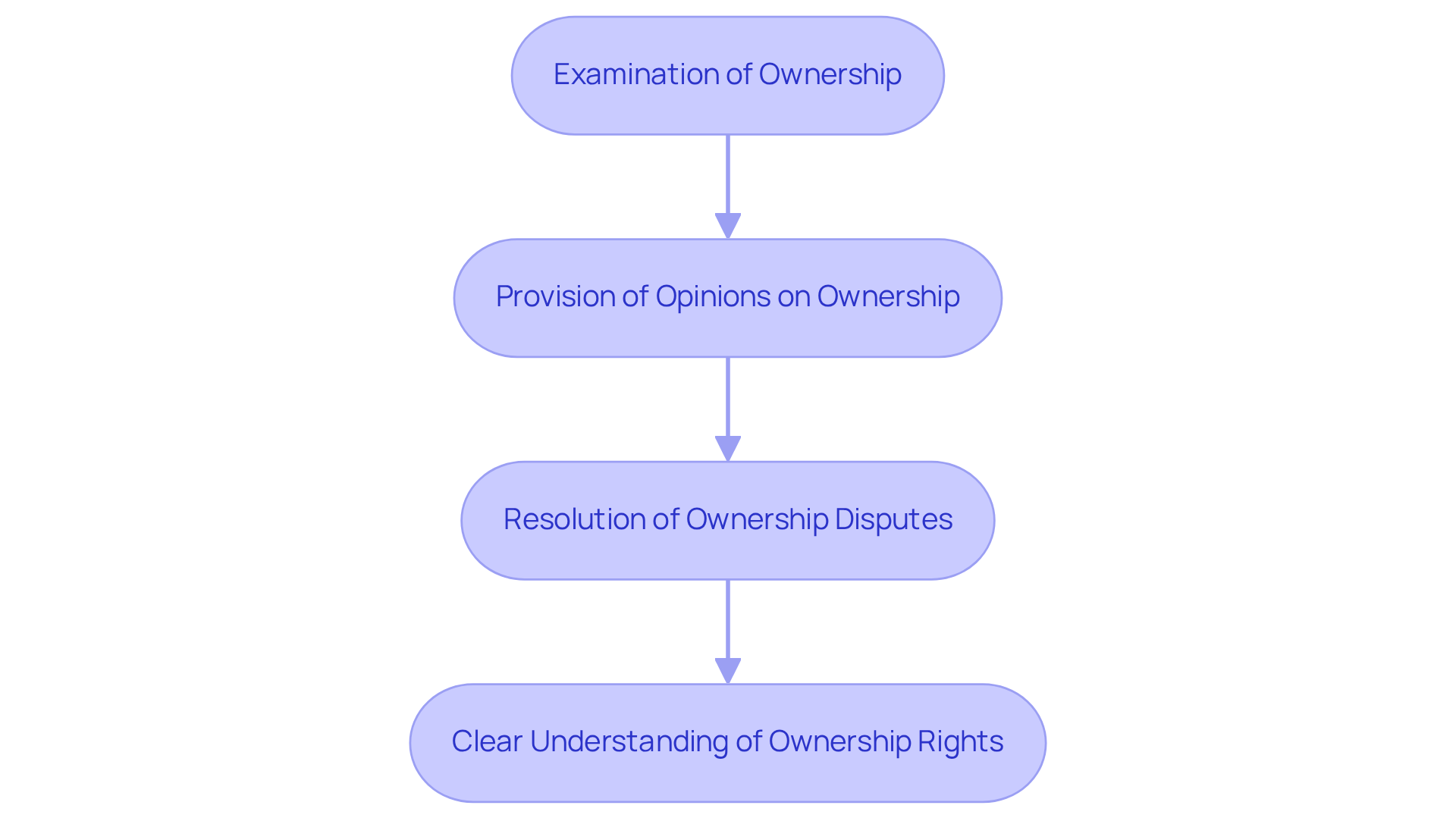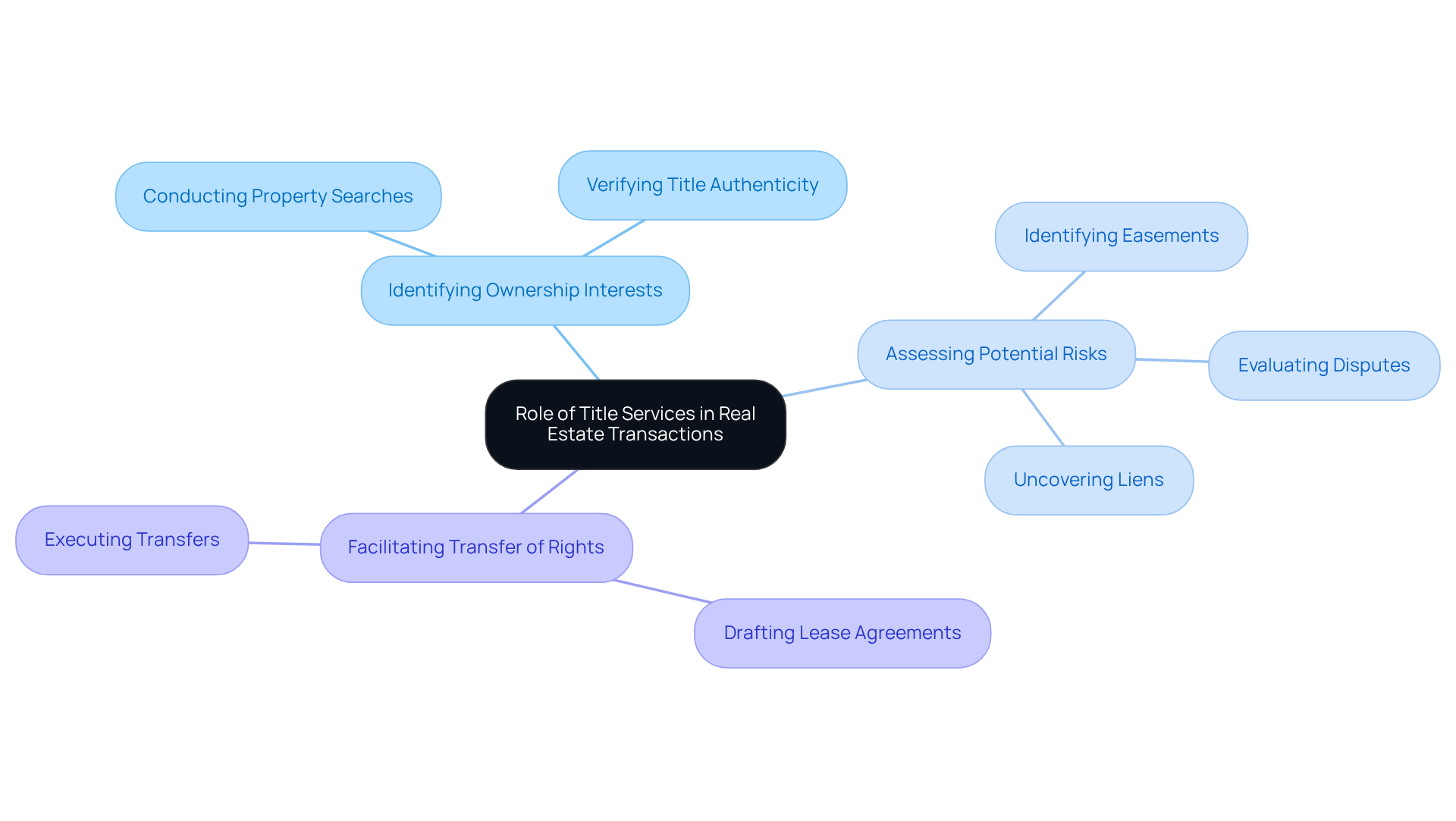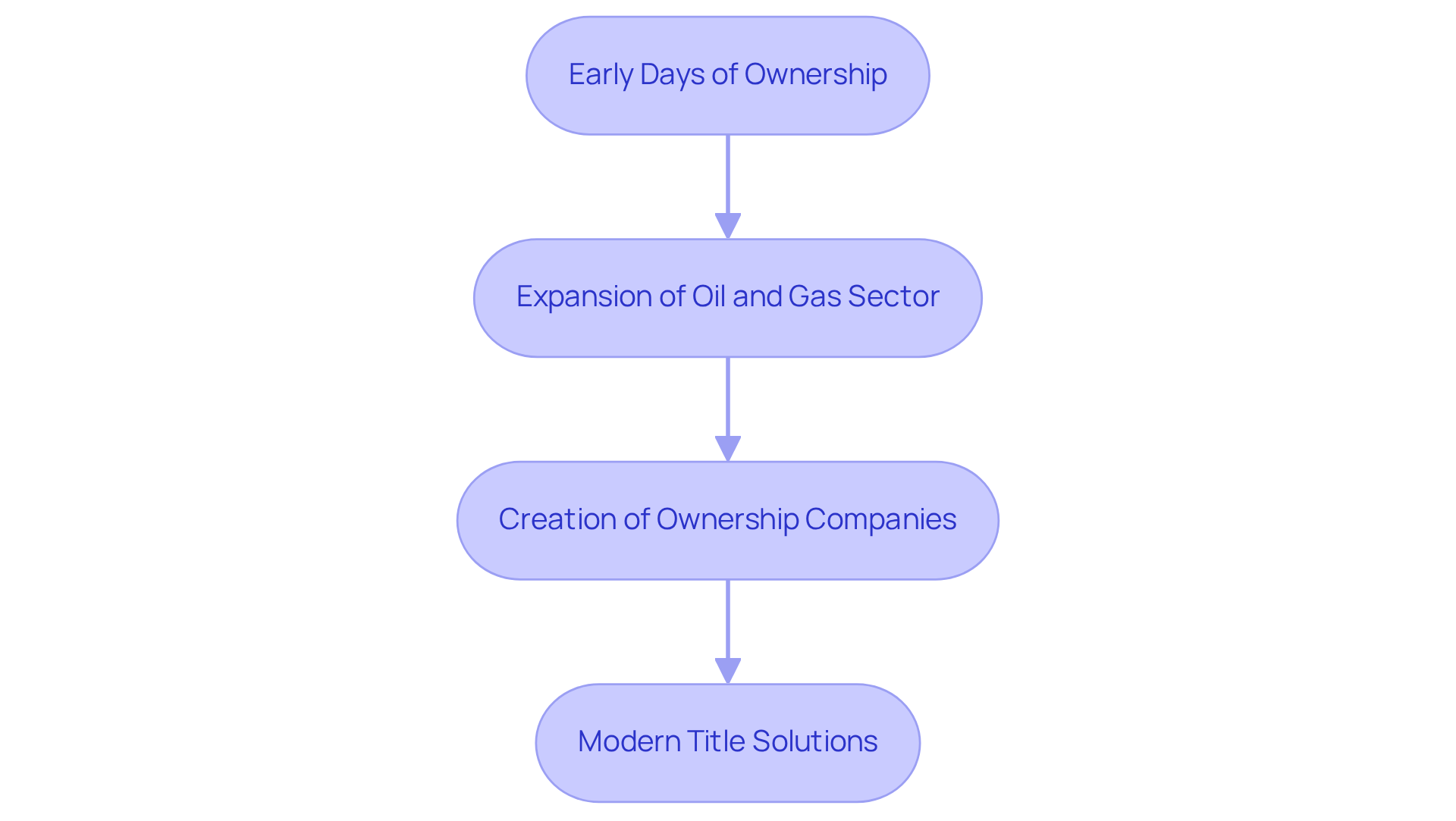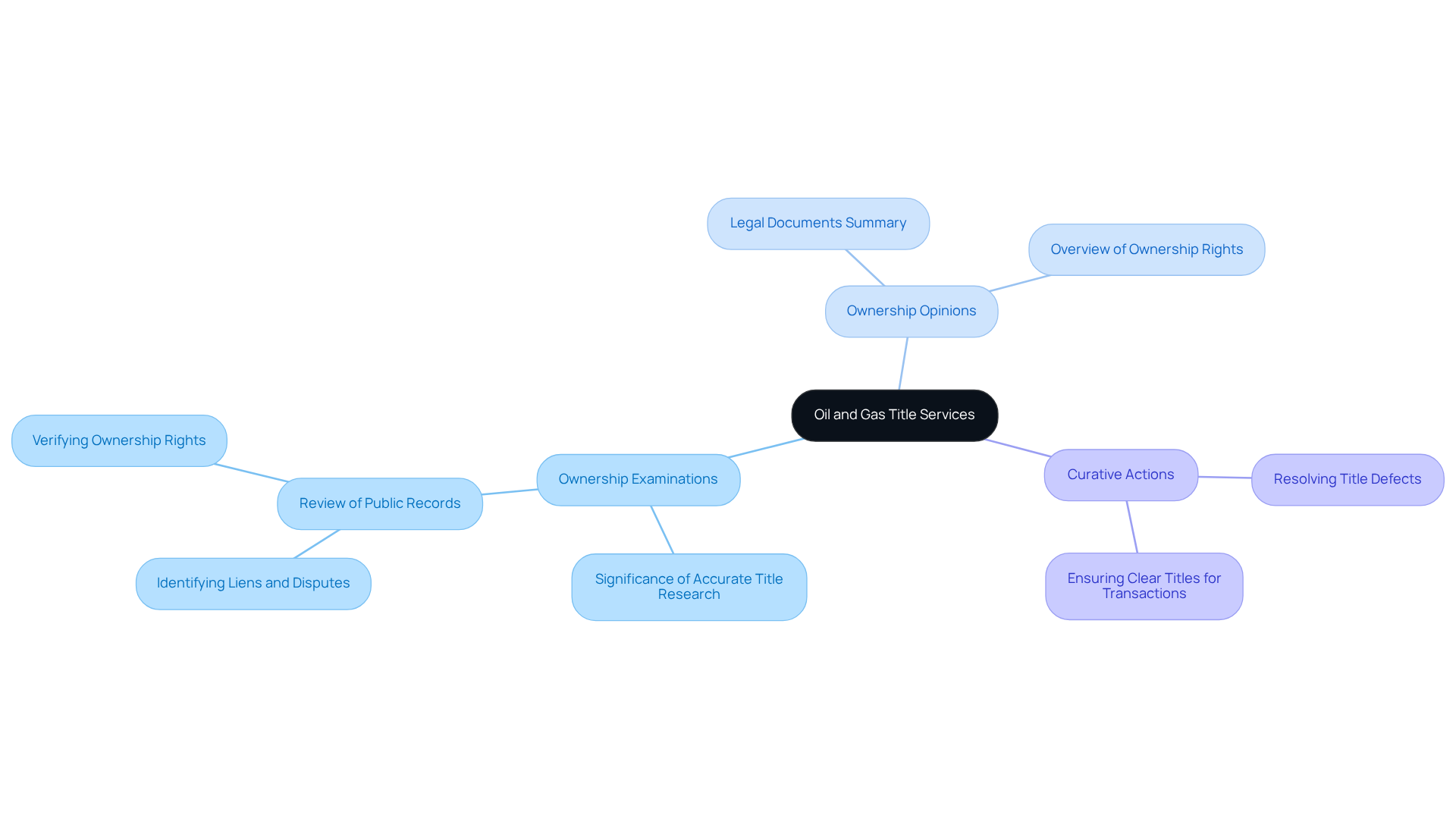Overview
The article underscores the critical components and evolution of oil and gas title services, which are vital for establishing ownership rights to mineral resources. It elaborates on how these services—encompassing ownership examinations, opinions, and curative actions—have transitioned from informal practices to sophisticated methodologies. This evolution ensures legal compliance and operational efficiency within the oil and gas industry, highlighting the necessity of accurate title research in navigating ownership complexities.
Introduction
The intricate world of oil and gas ownership is fundamentally anchored by the critical role of title services, which are essential for establishing and confirming rights to valuable mineral resources. By exploring the key components and historical evolution of these services, readers will discover how they facilitate transactions, mitigate legal risks, and promote transparency within the industry.
Furthermore, as the landscape of oil and gas continues to evolve, it is imperative to consider: how are modern advancements reshaping the processes that have traditionally governed ownership rights?
Defining Oil and Gas Title Services
The processes of oil and gas ownership are fundamentally tied to the , which include the methods and legal structures that confirm and establish rights to mineral resources, particularly oil and gas. These processes provide an overview of , encompassing a range of activities such as:
- Provision of opinions on ownership
The primary objective is to provide an , ensuring that all parties engaged in oil and gas transactions possess a , which is crucial for within the industry.
The overview of oil and gas title services highlights that plays a pivotal role in facilitating exploration, drilling, and production activities by helping to . Notably, the initial year's rent for oil and gas leases is set at $1.50 per acre, while the bonus bid for these leases is established at no less than $2 per acre.
Furthermore, the total acreage offered at competitive oil and gas lease sale auctions since January 1, 2009, underscores the extensive scale of leasing activities. The Bureau of Land Management (BLM) is instrumental in compiling comprehensive statistics on oil and gas leasing on Federal lands, further emphasizing the regulatory framework governing property transactions.
In addition, the to address research challenges aligns with the company's commitment to enhancing efficiency in workflows.

The Role of Title Services in Real Estate Transactions
Title assistance is vital in real estate transactions, ensuring that property documents are authentic, clear, and free from claims. This importance is magnified in the oil and gas sector, especially in the , given the complexities surrounding and lease agreements.
The [overview of oil and gas title services](https://blog.parseai.co/overview-of-probate-and-title-issues-key-insights-for-title-research) is instrumental in:
- Identifying ownership interests
- Assessing potential risks
- Facilitating the between parties
By conducting thorough property searches and assessments, companies can uncover any existing liens, easements, or disputes that may affect the property. This diligence protects the interests of purchasers, vendors, and investors alike. Ultimately, this process is essential for fostering within the industry.

Historical Evolution of Title Services
The development of can be traced back to the early days of land ownership and property rights. Initially, ownership verification was a basic process, often relying on informal agreements and local traditions. However, as the oil and gas sector expanded in the late 19th and early 20th centuries, the necessity for an as structured ownership assistance became apparent.
The legal complexities and increase in disputes over mineral rights prompted the creation of ownership companies and an [overview of oil and gas title services](https://blog.parseai.co/overview-of-title-commitments-key-structures-and-insights) for standardized methods of ownership assessments and opinions. Today, title-related solutions have become increasingly sophisticated, integrating to enhance efficiency and accuracy in research.

Key Components of Oil and Gas Title Services
Key elements of oil and gas ownership services include:
- Curative actions
These components provide an overview of . The overview of oil and gas title services emphasizes that the significance of cannot be overstated; to verify ownership and identify any potential issues, such as liens or disputes.
Furthermore, ownership opinions are legal documents created by lawyers that summarize the results of the examination and . When , become necessary; these actions provide an overview of oil and gas title services to resolve any discrepancies and ensure that the title is clear for future transactions.
Consequently, together, these components create a that includes an overview of oil and gas title services, supporting the legal and operational aspects of oil and gas exploration and production.

Conclusion
The exploration of oil and gas title services underscores their pivotal role in establishing and maintaining ownership rights over valuable mineral resources. These services extend beyond mere administration; they are fundamental to ensuring legal compliance and operational efficiency within the oil and gas sector. By delivering clarity and certainty regarding ownership, title services facilitate smoother transactions and mitigate risks associated with disputes over property rights.
This article has outlined key components of oil and gas title services, including:
- Ownership examinations
- Legal opinions
- Curative actions
These elements work in concert to create a robust framework that supports both the legal and operational dimensions of exploration and production. The historical evolution of these services highlights the increasing complexity and sophistication necessary to navigate the legal landscape, especially as technology continues to advance and reshape industry practices.
Ultimately, grasping the significance of oil and gas title services is essential for all stakeholders in the sector. As the industry evolves, remaining informed about current trends and the critical importance of accurate title research will be pivotal for ensuring successful transactions and fostering trust within the market. Embracing these services not only enhances operational efficiency but also safeguards investments in an ever-changing landscape.
Frequently Asked Questions
What are oil and gas title services?
Oil and gas title services refer to the methods and legal structures that confirm and establish rights to mineral resources, particularly oil and gas. These services include examining ownership, providing opinions on ownership, and resolving ownership disputes.
What is the primary objective of oil and gas title services?
The primary objective is to ensure that all parties engaged in oil and gas transactions have a clear understanding of ownership rights, which is crucial for legal compliance and operational efficiency within the industry.
How do oil and gas title services impact exploration and production activities?
Title assistance plays a pivotal role in facilitating exploration, drilling, and production activities by helping to mitigate the legal risks associated with property ownership disputes.
What are the initial rental and bonus bid rates for oil and gas leases?
The initial year's rent for oil and gas leases is set at $1.50 per acre, while the bonus bid for these leases is established at no less than $2 per acre.
What role does the Bureau of Land Management (BLM) play in oil and gas leasing?
The Bureau of Land Management (BLM) compiles comprehensive statistics on oil and gas leasing on Federal lands, emphasizing the regulatory framework governing property transactions.
How has Parse AI contributed to the oil and gas industry?
Parse AI collaborates with land industry experts to address research challenges, aligning with the company's commitment to enhancing efficiency in workflows within the industry.




